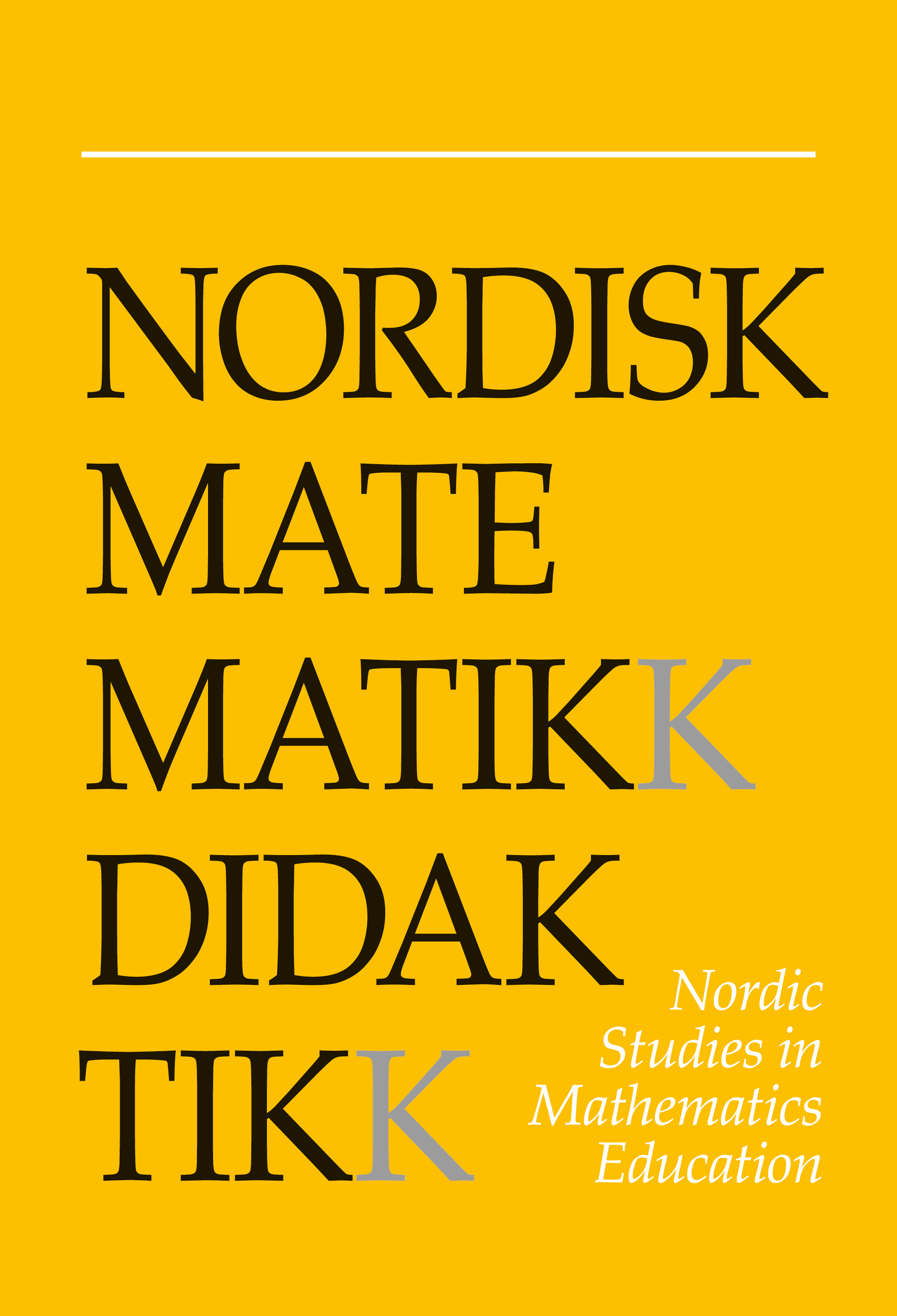Upper secondary school students’ gendered conceptions about affect in mathematics
DOI:
https://doi.org/10.7146/nomad.v17i2.148419Abstract
This study explores upper secondary school students’ conceptions about gender and affect in mathematics. Two groups of students from Swedish Natural Science Programme each answered a questionnaire; the first with a focus on boys and girls in general and the other with a focus on individuals themselves. The results from two questionnaires were compared. The first questionnaire revealed a view of rather traditional femininities and masculinities, a result that did not repeat itself in the second questionnaire. There was a discrepancy between traits students ascribed as gender different and traits students ascribed to themselves.
References
Brandell, G., Leder, G. & Nyström, P. (2007). Gender and mathematics: recent development from a Swedish perspective. ZDM, 39 (3), 235-250. https://doi.org/10.1007/s11858-007-0025-4
Brandell, G. & Staberg, E.-M. (2008). Mathematics: a female, male or gender neutral domain? A study of attitudes among students at secondary level. Gender and Education, 20 (5), 495-509. https://doi.org/10.1080/09540250701805771
Brandell, G., Nyström, P., Staberg, E-M., Larsson, S., Palbom, A. & Sundqvist, C. (2005). Kön och matematik. Preprints in Mathematical Sciences 20, Lund Institute of Technology, Centre for Mathematical Sciences, Lund University.
Devos, T. & Banaji, M. R. (2003). Implicit self and identity. In M. R. Leary & J. P. Tangney (Eds.), Handbook of self and identity (pp. 153-175). New York: Guilford Press.
Eccles, J. S. & Jacobs, J. E. (1986). Social forces shape math attitudes and performance. Journal of Women in Culture and Society, 11 (2), 367-380. https://doi.org/10.1086/494229
Forgasz, H. J., Leder, G. C. & Kloosterman, P. (2004). New perspectives on the gender stereotyping of mathematics. Mathematical Thinking and Learning, 6 (4), 389-420. https://doi.org/10.1207/s15327833mtl0604_2
Fredericks, J. A. & Eccles, J. S. (2002). Children's competence and value beliefs from childhood through adolescence: growth trajectories in two male-sex- typed domains. Developmental Psychology, 38, 519-533. https://doi.org/10.1037/0012-1649.38.4.519
Green, T. (1971). The activities of teaching. New York: McGraw-Hill.
Guimond, S. & Roussel, L. (2001). Bragging about one's school grades: gender stereotyping and students' perception of their abilities in science, mathematics, and language. Social Psychology of Education, 4, 275-293. https://doi.org/10.1023/A:1011332704215
Hammarström, A. (2005). Genusperspektiv på medicinen - två decenniers utveckling av medvetenheten om kön och genus inom medicinsk forskning och praktik (Report). Swedish National Agency for Higher Education.
Harding, S. (1986). The science question in feminism. Ithaca: Cornell University Press.
Jackson, L. A., Hodge, C. N. & Ingram, J. M. (1994). Gender and self-concept: a reexamination of stereotypic differences and the role of gender attitudes. Sex Roles, 30, 615-630. https://doi.org/10.1007/BF01544666
Jakobsson, A-K. (2000). Motivation och inlärning ur genusperspektiv. En studie av gymnasieelever på teoretiska linjer/program (PhD thesis). Gothenburg: Acta Universitatis Gothoburgensis.
Jost, J. T. & Banaji, M. R. (1994). The role of stereotyping in system-justification and the production of false consciousness. British Journal of Social Psychology, 33, 1-27. https://doi.org/10.1111/j.2044-8309.1994.tb01008.x
Kimball, M. (1994). Bara en myt att flickor är sämre i matematik. Kvinnovetenskaplig Tidskrift, 15, 40-53. https://doi.org/10.55870/tgv.v15i4.4867
Kimball, M. (1995). Feminist visions of gender similarities and differences. Binghamton: Haworth Press.
Kling, K. C., Hyde, J. S., Showers, C. J. & Buswell, B. N. (1999). Gender differences in self-esteem: a meta-analysis. Psychological Bulletin, 125 (4), 470-500. https://doi.org/10.1037/0033-2909.125.4.470
Leder, G. C. & Forgasz, H. (2002). Two new instruments to probe attitudes about gender and mathematics (ERIC, ED463312).
Pajares, F. (2003). Self-efficacy beliefs, motivation, and achievement in writing: a review of the literature. Reading and Writing Quarterly, 19, 139-158. https://doi.org/10.1080/10573560308222
Palmer, A. (2010) Att bli matematisk: matematisk subjektivitet och genus i lärarutbildningen för de yngre åldrarna (Doktorsavhandling). Stockholms Universitet.
Sidanius, J. & Pratto, F. (1999). Social dominance: an intergroup theory of social hierarchy and oppression. Cambridge University Press. https://doi.org/10.1017/CBO9781139175043
Skaalvik, S. & Skaalvik, E. M. (2004). Gender differences in math and verbal self- concept, performance expectations, and motivation. Sex Roles, 50, 241-252. https://doi.org/10.1023/B:SERS.0000015555.40976.e6
Stage, F. & Kloosterman, P. (1995). Gender, beliefs and acheivment in remedial college-level mathematics. Journal of Higher Education, 66 (3), 294-311. https://doi.org/10.1080/00221546.1995.11774781
Steele, C. M. (1997). A threat in the air: how stereotypes shape intellectual identity and performance. American Psychologist, 52, 613-629. https://doi.org/10.1037/0003-066X.52.6.613
Stipek, D. J. & Gralinski, J. H. (1991). Gender differences in children's achievement-related beliefs and emotional responses to success and failure in mathematics. Journal of Educational Psychology, 83 (3), 361-371. https://doi.org/10.1037/0022-0663.83.3.361
Sumpter, L. (in press). Themes of interplay of beliefs in mathematical reasoning. International Journal of Science and Mathematics Education.
Tajfel, H. & Turner, J. (1986). The social identity theory of intergroup behaviour. In S. Worchel & W. Austin (Eds.), Psychology of intergroup relations, (pp. 7-24). Chicago: Nelson-Hall.
Thompson, A. G. (1992). Teachers' beliefs and conceptions: a synthesis of the research. In D. Grouws (Ed.), Handbook of research in mathematics teaching and learning (pp. 127-146). New York: Macmillan Publishing Company
Valentine, J., DuBois, D. & Cooper, H. (2004). The relation between self-beliefs and academic acheivement: a meta-analytic review. Educational Psychologist, 39 (2), 111-133. https://doi.org/10.1207/s15326985ep3902_3
Volman, M. & Ten Dam, G. (1998). Equal but different: contradictions in the development of gender identity in the 1990s. British Journal of Sociology of Education, 19 (4), 529-545. https://doi.org/10.1080/0142569980190405
Walkerdine, V. (1998). Counting girls out. London: Falmer Press.
Zimmerman, B., Bandura, A. & Martinez-Pons, M. (1992). Self-motivation for academic attainment: the role of self-efficay beliefs and personal goal setting. American Educational Research Journal, 29 (3), 663-676. https://doi.org/10.3102/00028312029003663
Öhrn, E. (2002). Könsmönster i förändring? - en kunskapsöversikt om unga i skolan. Stockholm: Skolverket. Liber distribution.
Downloads
Published
How to Cite
Issue
Section
License

This work is licensed under a Creative Commons Attribution-NonCommercial-ShareAlike 4.0 International License.



